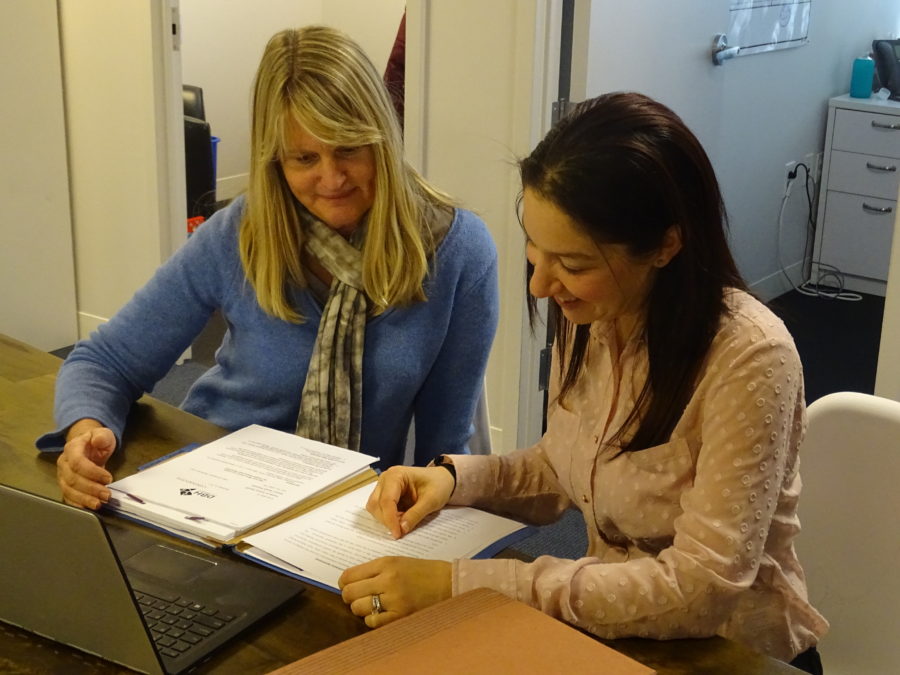Legal clinic aiding domestic violence victims, at-risk children, turns 10

DC VOLUNTEER LAWYERS PROJECT EXECUTIVE DIRECTOR KAREN MARCOU, LEFT, AND LEGAL DIRECTOR SARA TENNEN REVIEW A CASE FILE. THE ORGANIZATION TURNED 10 THIS MONTH. PHOTO BY DAN SCHERE
See an awesome article on us in the Washington Jewish Week! Excerpt below.
Legal Director Sara Tennen said domestic violence survivors come to their practice seeking a civil protection order from their abuser — a restraining order that protects the victim for one year. Those clients often come back to pursue permanent orders, such as divorce and custody, she said.
The organization’s lawyers also represent children in the city’s Superior Court system, generally to help determine what is in the child’s best interest.
“Oftentimes there’s domestic violence, drug abuse, sex abuse, all kinds of things going on,” Tennen said of the children’s cases. “And the judge will be in a situation where dad is facing significant incarceration with violent crimes, maybe mom is self-medicating with PCP, and the judge is trying to figure out what to do with these kids.”
Tennen said one recent child custody case was of a 5-year-old girl who said she was being abused by her mother’s boyfriend. The girl was living with her mother, but neither her mother nor maternal grandmother, who had filed for custody, took the concerns seriously.
“When she told the mom, the mom said ‘Well, don’t let him do that anymore,’ as if it was the 5 year old’s responsibility,” Tennen said. “The grandmother said the child has a good imagination.”
The child told the lawyers about the abuse. Tennen said the group’s lawyers met with the child’s great-grandmother, and she was awarded custody after a trial.
The organization’s attorneys also meet with teachers, doctors, mental health professionals and everyone else involved in the child’s life. Information gathered during this process is relayed to the judge, Tennen said.
Volunteer attorney Dale Harburg said the project works to normalize a child’s life.
“When a case is done, I hope we’ve made the family more stable,” she said.
Susan, a Silver Spring resident who asked that her last name not be due to privacy concerns, felt encouraged when she attended a free DC Volunteer Lawyers Project clinic in early 2016 with the goal of obtaining full custody of her three children. She had been divorced for several years, but her former husband had joint custody of the children. She said his emotionally and verbally abusive behavior was taking its toll on the family.
“He could not have any interaction with me without calling me names, and he did that in front of the children,” she said. “I signed my daughter up for Girl Scouts, but he wouldn’t take her when it was his turn. … We all felt that we were walking on eggshells around him.”
Susan said she was impressed with the time and research the attorneys gave to her case. In May 2016, she was granted custody of the children. Since then, her children have been earning straight A’s and are finally able to participate in after-school activities, she said. For Susan, the organization’s help let her avoid thousands of dollars in legal fees.
“As a single mom with one salary, having that stress gone was huge,” she said. “Just being able to be honest about my situation and talk to people who wanted to help was huge.”
The clinic, a nonprofit, had a budget of roughly $1.4 million according to its 2016 annual report. To cover its expenses, it relies on government grants, contributions from foundations, companies, law firms, individual contributors and others. Legal services often are contributed as well, and the clinic works with organizations that focus on domestic violence victims in need of legal help.
Todd Edelman, an associate judge in the Superior Court of the District of Columbia, said in his experience overseeing domestic violence cases, the difference between having a lawyer and not having one is “absolutely determinative” as to whether the victim will receive relief through the courts.“We have an acute need for lawyers to represent low-income people in all parts of our court,” he said.
Edelman said the organization performs an “essential role” in representing those clients.
See full article at



